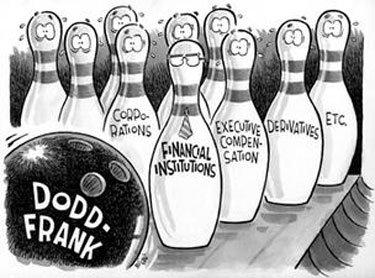Calculating the Impact of Dodd-Frank on Economic Growth
Banking, Dodd-Frank, Economics, Recession
Douglas Holtz-Eakin attempts to calculate the impact of the 2010 Dodd–Frank Wall Street Reform and Consumer Protection Act (Dodd-Frank) on the growth of the economy.
What did Dodd-Frank do to the effective tax rate on banks? Consider, first, the burden of complying with the new regulations. The American Action Forum’s analysis of the Federal Register indicates that the cumulative burden (including the market value of paperwork hours for compliance) is roughly $14.8 billion annually. Notice that after-tax income in the presence of the burden is:
[rL – C – Burden](1-tB)
where r is interest on loans (L), C is the cost of acquiring funds and other operations, and tB is the tax rate on banks. Suppose that instead of a burden, the same after-tax income was generated by simply raising the tax rate to t’. Then, by definition:
[rL – C – Burden](1-tB) = [rL – C](1-t’)
[which] can be re-arranged to yield:
t’ = tB + (1-tB)[Burden/(rL-C)]
To put some empirical meat on [this], the Federal Deposit Insurance Corporation’s (FDIC) Quarterly Banking Profile (QBP) provides information on taxes ($67.5 billion) and net income ($151.2 billion) that permit one to compute an initial tax rate of 31 percent. Using the AAF burden data and (11) yields an increase to 37.8 percent from compliance burdens.
A similar approach can be used to transform the roughly 2 percentage point rise in the leverage ratio of the banking sector (from 7.5 to 9.5 percent) from 2008 to 2014 into a rise in the effective tax rate. The banking sector responded to Dodd-Frank by holding more equity capital, thus require it to have greater earnings to meet the market rate of return – the same impact as raising taxes. In this case, the higher leverage ratio translates into a further increase in the effective tax rate to 40.3 percent, for a total rise of 9.2 percent.
Collecting results, the impact on economic growth is a decline in the per capital growth rate of 0.059 percentage points annually. Is this a big deal? Consider lowering the growth rate in the Congressional Budget Office baseline projections by exactly this amount between 2016 and 2025. The lower rate of economic growth translates into a total loss of $895 billion in GDP or $3,346 for every member of the working age (16 and older) population over those 10 years.





